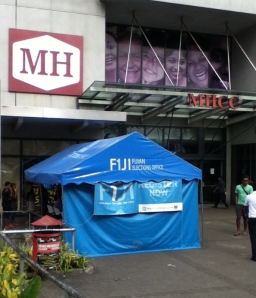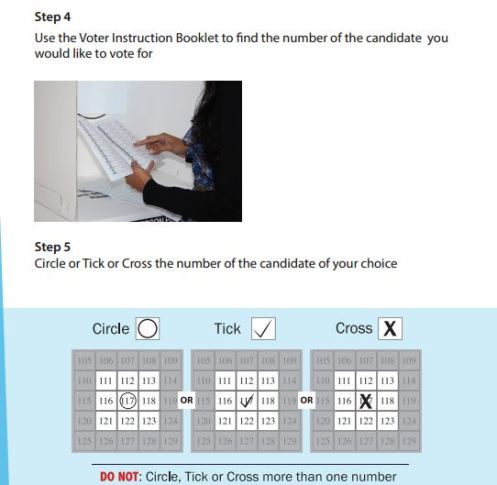Election time (only a few years late)
In about 6 weeks, Fiji will have the first national elections since the coup unpleasantness in 2006. Registered voters will be electing all 50 seats in Parliament at once, on a non-district, at large basis. Every voter gets to choose only one person, and the seats will be awarded by a formula I don’t really understand. It’s not the top 50 vote-getters that get the 50 seats, because that would make sense.
I’ll try not to get too Nate Silver when explaining this (as far as I understand it, which is not entirely); I get that it’s complex and can get a little boring when we crunch the numbers, but this is important. So try to keep up.
It will basically go by political party popularity contest: if your party’s candidates get at least 5% of the total votes cast, your party will go on to the bonus round (I am paraphrasing here). If you are an independent candidate (no party) who can’t attract 5% of the total vote, or your party gets a lot of candidates ranked in the top 50 but only 4% of the total, you get…nothing. There are at least 7 registered parties as of now.
So theoretically, you could have a split like this:
Party A: 74%
Party B: 11%
Party C: 4.5%
Party D: 4.5%
Party E: 4.5%
Independents/other parties 1.5%
Where Party A and Party B get all the seats, and though Parties C, D, and E combined got more votes than Party B and thus could have formed some kind of “We disagree with Party B” coalition, they don’t get a single seat in Parliament. If beloved hometown Candidate X from a tiny island (let’s call it Vermont, just for an analogy that only people who follow American politics will understand) got EVERY vote on Vermont Island, but Vermont Island is 3% of the total voting population and nobody in Suva has ever heard of Candidate X and doesn’t vote for him/her, Candidate X will only get a seat if he/she belongs to a popular enough party that fields candidates that get enough votes to make the 5% threshold.
While Wikipedia assures me that stable Western democracies like Denmark, Austria and Finland use this type of proportional method for awarding seats, I’m not clear on if those places field candidates “at large” or by districts. Chances are none of them have elected an entire Parliament from scratch with no incumbents anytime recently. Since Fiji has 110 inhabited islands, candidates from places like tiny hypothetical Vermont Island will be at a big disadvantage compared to candidates from cities.
But considering the old method was also not district-based, but instead based on ethnic constituencies (ie 23 seats reserved for indigenous Fijians, 19 for Indo-Fijians, 1 for Rotumans, and 3 for minorities such as Caucasians and Chinese, and 25 open constituencies), who’s to say if this is more fair, or less fair. Like US politics, candidates who used to be incumbents or have name recognition will certainly have an advantage.
So since there’s been no Parliament since 2006, and all the political parties have been dormant for a decade (since there’s been nothing to run for), who’s got the home field advantage?
Well, that would be Acting Prime Minister Frank. Frank was a military man when he assumed the office of Prime Minister, so he wasn’t really affiliated with a party when the coup unpleasantness happened in 2006. Fiji was supposed to have elections in 2009, but didn’t because… reasons. Now that Fiji is ready to have fair and above-board elections, Frank has formed a totally new party called FijiFirst and is running for election as Prime Minister.
Hypatia’s FijiFirst and 2014 Election FAQ
Q: What do FijiFirst advertisements look like?
A: There are a lot of them on cabs and mini-busses that look like this:
Q: Wait, doesn’t that look a lot like a sign that’s by the Bau street roundabout promoting road safety that went up a month or two ago?
A: What, you mean this one?
Q: Yeah, that one. Don’t you think it looks like a campaign ad?
A: Don’t be silly. He’s wearing a bula shirt on the campaign ad and a suit and a flag pin in the official government sign. Totally different.
Q: But isn’t “together we can save millions of lives” is a pretty dumb slogan considering there’s only about 903,000 people in Fiji and the government’s own statistics page says that there were only 15 fatal traffic accidents in 2009? How exactly are we to save millions of lives…will buckling up save lives in other countries? And why “Wear. Believe. Act”? Do you have to have faith in order for the seat belt to work?
A: Yeah, the sign is pretty dumb. But let’s go back to talking about FijiFirst. What else do you want to know?
Q: Don’t you think it’s weird that there’s a number 1 in the F1ji logo in the voter registration tent photo at the top of this post? Is that supposed to subliminally make people think of “Fiji 1st” when they register to vote?
A: Certainly not. The 1 is for one vote, since some people think they get to vote for more than one candidate since there’s 50 seats up for grabs. Only an idiot would confuse “one” and “first”.
Q: Wait, didn’t the elections minister (who is also the current Attorney General and a member of the FijiFirst party) recently say that a new party called “One Fiji” could be confused with “FijiFirst” and try to keep them from registering as an official party?
A: Yeah, that happened. What’s your point?
Q: It’s just a little weird to see a 1 in the F1ji logo in an official voter registration booth that’s supposed to be non-partisan, especially if that same government’s elections minister who is also a candidate is claiming “one” and “first” are confusable.
A: There’s nothing weird about a party loyalist simultaneously being an elections official. I mean, Katharine Harris was in charge of running Florida’s election in 2000 while she was also the chair of Bush’s re-election campaign,and that election went totally smoothly and fairly with no legitimacy problems, right?
Q: Uh, let’s change the subject. How will the ballots look for this election? I assume everyone’s name and party will be listed in some random order, since there could be over a hundred candidates to choose from?
A: Oh no, that’s too confusing for the average voter. Instead, the ballot paper will contain a total of 280 numbers, from 135 to 414, and you’ll use a guide book to find the number of the candidate you want to vote for, and then mark their number on your ballot. Like this:
Q: That seems a bit weird. Is that how they did it before?
A: No, in prior elections they listed the candidate’s names and party symbols. But I’m sure this will work just fine.
Q. Is the international community sending observers to make sure the election is actually fair?
A. Yep, Australia is confirmed…
Q. Okay, that’s good news.
A….and Indonesia will be the co-leader of the observation effort.
Q: Indonesia?! You’re talking about the same country from that recent documentary about how some of the people who were in the Suharto death squads in the 60s are now in semi-legitimized paramilitary organizations instead of in prison for genocidal crimes?
A: Well, I was thinking of it as the country that has Bali in it, but yeah, same place.
Q: Pardon my language, but isn’t this election going to be a total clusterfuck?
A: Welcome to the South Pacific.





So Indonesia sending observers to Fiji gets questioned about supporting genocide, yet a terrorist nation like Australia, doesn’t? Australia – the country that had the White Australia Policy and also the country where the genocide of the native people took place.
Well this proves your fairness. After all, you must be a white person from a white nation. So it is obvious that you’ll side with another white nation and ignore and hide the historical crimes that were committed there, but question other non-white nations about their crimes instead.
I never knew you would get this low. But, like I said. Since you’re a white person, you’re bound to favor Australia. This is everything against what the United States of America is about. Now the question is, how American are you? Why such special treatment for Australia?
If you are going to question one nation, then question all nations. Otherwise, you’re proving your favoritism.
Your contract must be expiring soon and you may be leaving Fiji after that. And that must be why you find the freedom to openly give your full support to terrorist nations like Australia!
POC, you’ve posted comments in here previously about your dislike of Australia, but throwing around the phrase “terrorist nation” is a bit extreme, to say nothing of making anyone reading your argument think you lack a sense of proportion. Syria and Iran are state supporters of terrorism. The White Australia policy, while disagreeable, did not result in people randomly being killed in the street. More importantly, unlike Indonesia, there is no one currently alive and active in Australian politics who was murdering scores of suspected Communists IN MY LIFETIME.
It is important to note that the Indonesian government not only didn’t arrest and try the people that committed the slaughter of “Communists” in the late 1960s, some of these murderers are currently leading political organizations in Indonesia. You really think the Australians are gonna be worse than these guys for observing the Fijian elections for fairness?
Your hypothetical “Vermont island” party would never have been registered in the first place (unless there were a lot of Vermont Islanders scattered through the rest of Fiji) because, per the Political Parties Decree, “the party must have at least 5000 members from all four divisions of Fiji – 2000 from the Central Division, 1750 members from the Western Division, 1,000 members from the Northern Division and 250 members from the Eastern Division”
Under the old system, although the number of seats was split by race (“communal” voting), there were then normal constituencies, so, since everyone had 2 votes (one communal, one open), everyone also had 2 MPs to represent their interests in parliament (and to whinge to about the inadequacies of government service).
Good point, Christine. I suppose the thing that baffles me is that even if Party A has support across all of Fiji and fields a candidate from Vermont Island, that candidate might still not get elected if he/she carries Vermont Island, even if other Party A candidates win as well. It seems the current system will favor candidates from cities (where the most votes are), and even then the voters in Labasa and Levuka probably have different issues than the voters in Nadi. It will be very interesting to see what actually happens when the votes are counted.
Having grown up abroad across the Pacific; I know it’s hard for a PNWer – but just ignore local politics completely aside from any imminent coups or impacts on your safety.
And as you’ve alluded to.. our corruption is just more sophisticated. Our oligarchs have better PR teams.